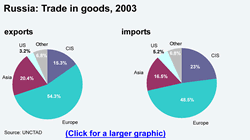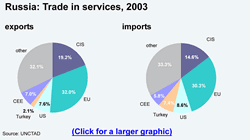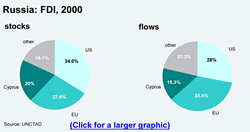RUSSIA/US: Summit unlikely to improve ties
Presidents George Bush and Vladimir Putin meet in Bratislava tomorrow for the first Russian-US summit since last year's US elections. The summit takes place at a troubling time in bilateral relations. Putin's interference in the Ukrainian presidential election, persecution of Yukos and backsliding on democratisation have put the question of values firmly on the bilateral agenda. There are also growing strategic tensions in the former Soviet space and serious disagreements on several international issues, notably Iran.
Analysis
The Russian-US summit comes after an especially difficult year in the relationship.
Key assumptions
- Russian-US relations are at their lowest ebb since Putin became Russian president, possibly even since the collapse of the Soviet Union.
- After a period of 'realism' driven by common security priorities, the bilateral relationship is once again dominated by the normative agenda -- the state of democracy in Russia, the rule of law and media freedom.
- Moscow and Washington's much-vaunted 'strategic partnership' is hollow. Divisions between the two sides are more numerous and serious than what they have in common. Security cooperation is half-hearted. Agreement in principle on international terrorism and WMD proliferation is undermined by significant policy disagreements, particularly on Iran.
- Although talk of a crisis in Russian-US relations is overblown, true partnership is a distant goal, and stagnation is more likely.
There were frequent public clashes during 2004 on a range of issues, including:
- Russian President Vladimir Putin's clampdown on domestic political and civil freedoms;
- the dismemberment of oil major Yukos;
- Moscow's assertive and at times aggressive approach in the former Soviet Union; and
- Russian nuclear assistance to Iran.
Even strong supporters of 'strategic partnership', such as US Ambassador Sandy Vershbow in Moscow, acknowledge there has been 'some drift'. Other observers, less constrained by diplomatic niceties, describe the current state of the relationship as the worst since the collapse of the Soviet Union. They argue -- rightly -- that Russian-US relations are thin on substance, over-dependent on the personal chemistry between Putin and US President George Bush, and riddled with mutual suspicions and fears. Security and economic cooperation is often more rhetorical than real, while 'Russia fatigue' in Washington is matched by growing anti-US sentiment in Moscow.
Changed agenda. In the aftermath of September 11, 2001, the bilateral relationship was shaped by a tacit bargain: Moscow supported the Washington-led global 'war on terror' in return for a generally free hand on domestic policy. So long as Putin continued to lend verbal support to the ideals of a civil, democratic society, then the Bush administration was prepared to make allowances on implementation.
This arrangement has unravelled badly over the past twelve months. The 'freedom project' of Bush's neo-conservative constituency is one reason. More important is the fact that Putin has taken US acquiescence for granted. Buoyed by the consolidation of his political power and Russia's consistently high growth rates, he has become over-confident and lost his appreciation of the possible risks. Whereas once he was conscious of the West's sensitivities on such issues as human rights, his attitude has become increasingly unrepentant.
Consequently, the debate on values has returned, and is reflected in a series of disagreements:
- Kremlin management of Yukos affair. Although this has festered for some 18 months, it has come under the spotlight again following the murky 'sale' of Yukos production arm Yuganskneftegaz, into what is in effect state ownership (see US/RUSSIA: Yukos bankruptcy filing deters financiers - December 24, 2004). Putin rejects Washington's criticisms that such manoeuvrings are incompatible with his commitment to the rule of law.
- Putin's reforms of power. The administration has criticised Kremlin moves to appoint rather than elect governors and to conduct the next (2007) parliamentary elections on the basis of approved party lists only (see RUSSIA: Can Putin solve the ex-Soviet state crisis? - October 12, 2004). Putin's rationale for the reforms, that they are necessary to strengthen the fight against terrorism, does not convince Washington.
- Media freedom. The increasing pressure exerted by the Kremlin on independent media outlets resonates very negatively in the United States.
- Chechnya. Washington is dismayed by Moscow's dual policy of brutal 'police actions' and blatant manipulation of the political process. The Kremlin counters that Washington's attitude reeks of double standards, especially in light of developments in Guantanamo and Abu Ghraib.
- Persecution of NGOs. Washington is concerned about harassment of non-governmental organisations (NGOs) in general, and restrictions on Protestant missionary activity in particular.
International security. After September 2001, both sides hoped that security cooperation would form the basis of a qualitatively new relationship. These hopes have since given way to mutual disappointment and disillusionment:
- War on terror. Moscow and Washington agree in principle about the primacy of the threat of international terrorism and share a visceral fear of Islamic radicalism. However, actual counter-terrorist cooperation is unimpressive. There is some intelligence sharing, mainly within the framework of the counter-terrorism working group, but little trust. Russian policy-makers are increasingly concerned about how long the US military presence will remain in Central Asia, and insist that the UN should be the main coordinating body in international counter-terrorism. Washington, for its part, believes that Russia's conduct of the Chechen conflict is part of the problem rather than the solution.
- WMD proliferation. The same discrepancy between agreement in principle and sharp policy differences is evident on proliferation issues. Like Washington, Moscow identifies weapons of mass destruction (WMD) as a major threat to international security. However, beyond such generalities there is little consensus, particularly on the highly contentious issue of Russian nuclear assistance to Iran, which the administration believes will help Tehran develop a nuclear weapons capability in the near future. Another growing source of tension is Russia's relationship with Syria, a recent target of US opprobrium (see RUSSIA/SYRIA: Moscow poses as big Middle East player - February 18, 2005). The imminent prospect of Russian sales of anti-aircraft missiles to Damascus does nothing to improve US confidence in the Kremlin's practical commitment to non-proliferation.
- Conflict resolution. This is the most asymmetrical area of the security relationship. Whereas the United States is the prime actor in Iraq and elsewhere in the Middle East and a major player in the North Korean question, Russia's importance is peripheral. It is unwilling to commit any troops to Iraq; its role in the Middle East peace 'Quartet' is formalistic; and it is the least important player in North-east Asia. Even where Russia could make a difference -- in the former Soviet Union -- its obvious lack of impartiality has destroyed its credibility as a mediator in the 'frozen conflicts' of Abkhazia, South Ossetia, Transnistria and Nagorno-Karabakh.
CIS. Notwithstanding claims that geopolitical competition is a relic of the past, the reality is very different:
- Moscow is convinced that Washington is pursuing a consistent policy of strategic encroachment in Russia's natural 'spheres of influence' -- not only in the CIS (Central Asia, the Caucasus, Ukraine), but also Central and Eastern Europe via NATO enlargement.
- US policy-makers fear that Russia has learnt virtually nothing from the mistakes of the past. They are dismayed by Putin's attempts over the past 12-18 months to reassert Russian strategic influence in the former Soviet Union through such mechanisms as the Collective Security Treaty Organisation (CSTO) and the common economic space (CES). The methods may be more sophisticated than in Soviet times, but for many in Washington, Russia's imperialist mindset remains the same. Putin's intervention in the Ukrainian presidential election (see RUSSIA/UKRAINE: Moscow muddles its policy on Kyiv - December 13, 2004) resurrected suspicions of a Russian threat and the idea of Russia as the 'other', alien and obstructive.
Economic relationship. Many observers lament not just the continuing tensions in relations, but also the 'staleness' of the bilateral agenda, which appears to have changed little from the Cold War era. The low level of economic ties is symptomatic of this. Bilateral trade is many times lower than that between Russia and the EU. US investors are prominent among foreign investors, but lead a meagre field: in reality, they have shown only limited interest in Russia (and suffered badly when they have become involved). There have been numerous trade disputes, particularly on agriculture and intellectual property rights. It is clear that the United States, which holds the key to Russia's accession to the WTO, will drive a hard and possibly bitter bargain.
The one area of real promise, the energy relationship, has been severely undermined by the fall-out from the Yukos affair. Forecasts after September 2001 that Russia would increase its share of the US global energy market to 10% have proved wide of the mark. Moscow has been unable to sell itself as a reliable alternative supplier in contrast to an unstable Middle East; the bilateral energy dialogue has stagnated and Russia continues to be a peripheral supplier of US energy needs, providing just 1.9% of US crude oil imports in December. Although there are important US interests (ExxonMobil, ConocoPhillips) in the Russian energy sector, doubts about the rule of law and commercial transparency have limited their potential.
Making amends. Both presidents will use the Bratislava summit to initiate some kind of recovery. However, they do so from very different perspectives.
Bush will probably be more assertive than at previous summits. This will centre on the need for a better Russian performance across all areas of the relationship. He will push 'values', in keeping with the emphasis in his inauguration speech on promoting freedom throughout the world. To this end, he will:
- press Putin to deliver on democracy, the rule of law and a civil society;
- seek assurances that Russia will engage constructively in the CIS, especially in Ukraine and Georgia; and
- put pressure on Russia to distance itself from 'dubious' international company, Iran in the first instance.
Putin sees the summit as primarily an exercise in damage limitation. He understands that Washington's criticisms of his domestic and foreign policies are not just politics, but reflect genuine US concerns about current trends in Russia. He will therefore probably use the summit to:
- reiterate the Kremlin's commitment to democracy, a transparent market economy and a civil society, while at the same time asking for understanding of Russia's 'special' difficulties in implementing reforms;
- reaffirm interest in constructive engagement with the United States, principally in international security and energy cooperation; and
- declare that Moscow has no imperialist designs in the CIS, although he will emphasise that Russia has considerable -- and legitimate -- political, security and economic interests in the region, from which it will not withdraw.
Short-term outcomes. The Bratislava summit may pass off reasonably well, with both presidents anxious to make a good impression. The summit will therefore serve a useful presentational purpose and could provide some modest impetus to certain areas of current and potential cooperation.
However, the intractability of many issues, the difficult policy environment in Russia (and the United States), and the brevity of the discussions (expected to last four hours) mean that no breakthroughs are likely. Putin may listen carefully to Bush's representations and give assurances on such sensitive issues as Iran and Ukraine, but is unlikely to offer real concessions, concrete or moral.
In the short to medium term, little substantive change may be expected. There may be some slight improvement in the bilateral atmosphere, although this will depend on Putin returning to more discreet ways of projecting Russian influence in the CIS and conducting relations with Iran and Syria.
Longer-term prospects. In the longer term, a new quality of relationship is an even more remote prospect, for several reasons:
- Unequal relationship. Although often described, misleadingly, as a 'strategic partner', Russia is of value to the United States in only a very few, circumscribed areas -- such as countering Islamic-based radicalism and terrorism in Central Asia. For the most part, the United States views Russia as neither a partner nor strategic, but as an awkward country with which it engages as best it can.
- Foreign policy priorities. Washington's concentration on other parts of the world, particularly the Middle East, will ensure that Russia remains secondary for Washington for years to come.
- Cultural divergence. Putin will not depart from the fundamentals of his domestic and foreign policy, minimising the prospect of an eventual strategic convergence with the United States. As long as democracy and the rule of law remain more fiction than fact in Russia, it will not be seen as a reliable political and economic partner. Crucially, too, Washington will not trust it to be a major supplier of its energy needs.
Conclusion
Russia and the United States have very different conceptions of their relationship. Putin seeks engagement on the basis of selected common interests in security and energy, while relegating normative issues to the margins; for the Bush administration, interests and values are closely intertwined. These two visions are irreconcilable. While a major crisis is unlikely, a substantial improvement in Russian-US relations is even more improbable.


